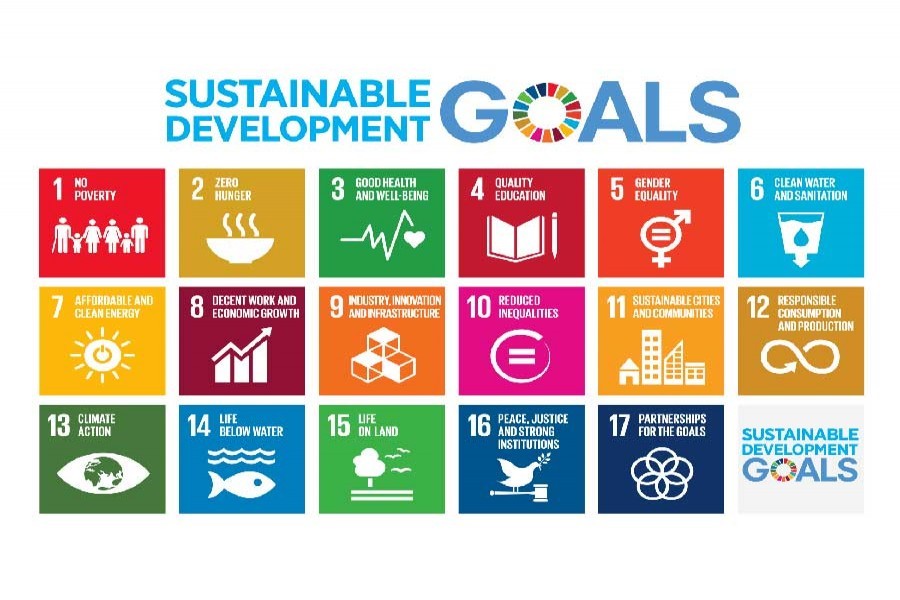Achieving SDG goals for Bangladesh and other developing countries is quite uncertain given the present state of the economy and geopolitical situation said speakers at a seminar on Thursday.
They also stressed the need for immediate arrangements for ensuring financing for developing countries to enable them to meet their goals.
The Department of International Relations and the Ministry of Foreign Affairs jointly organised the seminar titled, “Bangladesh's Journey to SDGs: From Negotiations to Implementation” in the city.
Foreign Minister Dr AK Abdul Momen said, “Bangladesh’s success in achieving SDG is rooted in the holistic approach by the government in implementing the targets in collaboration with our development partners, including the UN systems, civil society, academia, media, and other stakeholders”.
Citing the achieving the SDG goals he said technology transfer and financing of SDGs are major issues while the global economy is trying to recover from the supply chain disruption caused by the pandemic and the new disruptions resulting from the impact of the Ukraine war.
According to him these disruptions further widened the financing gap.
The developing world needed investment and funding more than ever before to improve the productive capacity, including industrialisation, export diversification, and infrastructure development as well, he said.
“As an internationally acclaimed role model of development, Bangladesh has a critical role to play in leading the developing world on critical issues of sustainable development including climate finance. Technology Transfer, global food and energy security, as well as stabilising the international trading mechanism” he pointed out.
He noted that as developing countries are extremely vulnerable to external shocks, it is crucial to establish crisis mitigation and resilience-building fund for the countries to ensure the sustainability of their hard-earned development games.
“It is important to start this immediately. The Ministry of Foreign Affairs stands ready to receive on the challenges faced with any specific SDG targets on indicators due to pandemic conflict in Europe, climate change or resource constraints” he added.
“Furthermore, we are committed to sensitising all our missions abroad including those extradited to the UN offices to highlight those challenges as part of various bilateral conversations and global discourses”.
Pointing out the financing gap he said, currently, on average, the development partners provide only $156 billion a year to the developing countries which is around 3.0 per cent of the expected SDG expenditure.
The minister said recently he urged the UN to arrange a high-level event on SDG financing.
He said that though the SDG goals are achievable, under the current scenario, it is uncertain.
“I'm not very optimistic. Unless we get it up and take strong initiatives for arranging financing and technology transfer” he added.
Addressing the seminar state minister for planning Shamsul Alam said, the estimated SDG implementation would require USD 66 billion annually which is only 20 per cent of the country’s GDP.
The UN estimated USD 3.0 to 5.0 trillion is needed annually to implement the whole course of SDGs, so compared to this, Bangladesh’s requirement of US$ 66 billion is not big, he added.
He said that out of these 66 billion dollars, 54 billion euro would be coming from domestic resources and others will from ODA with no FDI.
“43 per cent will come from public funds and 34 per cent from the private sector
“Why public fund is so big because many public welfare aspects are included here and you know government should play a big role in public welfare related sectors” he added.
He said that the government has strengthened the monitoring framework for reviewing the SDG implementation situation.
But the state minister admitted that though measures were taken to enhance data availability, it is still a major problem in reviewing the implementation status.
Executive Director of the Center for Policy Dialogue Professor Fahmida Khatun said taking the legacy from MDGs, Bangladesh has quite well adapted to the SDGs agenda because the country has already done a number of work in areas of poverty in damage alleviation in areas of health and education in the areas of gender empowerment.
“During the post-MDGs, many have asked me what is the secret of Bangladesh in being successful in achieving these MDGs. My simple response is that you see, be it MDG or not, Bangladesh has been pursuing its development activities in the areas of economic growth in the areas of social development since its inception” she said.
She explained that Bangladesh’s development experience had actually contributed to the designing of the SDGs for the Government
“And as we have seen that many of the SDGs are Bangladesh's recommendations, how they overlap with the SDGs which have been finally accepted by the global community. So that is the negotiation or the initiation of the SDGs.
The government, in the spirit of MDGs right after the SDG adoption, had undertaken a number of exercises starting from aligning the SDGs with the midterm and long-term plans and also sectoral plans, Dr Fahmida said.
Since the agenda is huge, we also need huge resources, human resources, and the exercise on the financial requirement, I think that is also one of the significant activities towards the government's effort to implement the SDGs and then also the mapping of the SDGs in various ministries and plans, she said.
Professor Maksud Kamal Pro Vice Chances of Dhaka University, Chairman of the Department of International Relations of Dhaka University Dr Ashraf Ali, and Asad Alam, Rector of the Foreign Service Academy also spoke on the occasion.


